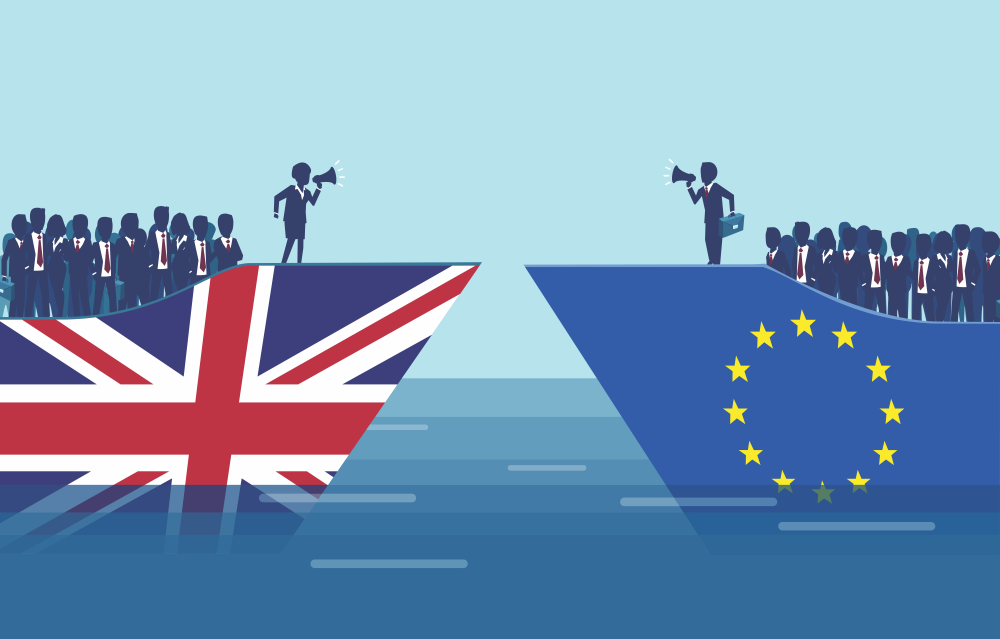
Today (23 June) marks the sixth anniversary of the UK’s vote to leave the EU and debate continues to rage over the referendum outcome in 2016.
The IOE&IT Daily Update here looks at the pros and cons that have emerged since the UK completed its departure from the bloc in 2020.
Pros
UK makes most of independence
Since leaving the EU, the UK has been free to sign trade deals on its own terms.
As well as rolling over many of the trade deals that the UK had with countries as part of the EU, the UK has also been able to sign fresh agreements with countries such as Australia and New Zealand, and is currently negotiating new terms with the likes of India, Canada and the Gulf.
A deal with the EU was also achieved, which came into force on 1 January 2021 and prevented any tariffs and quotas being introduced with the UK’s largest trading partner.
The UK has since set its sights on another trade bloc – the Comprehensive and Progressive Agreement for Trans-Pacific Partnership (CPTPP) of 11 Pacific nations which it is currently in negotiations to join.
Legislative reform
The UK now also has full sovereignty to make, revoke and reform its laws.
Brexit opportunities minister Jacob Rees-Mogg has launched an online dashboard listing 2,400 pieces of EU laws that were retained in UK statute following Brexit, inviting the public to say which ones they want to repeal, according to the FT.
“This dashboard offers the public a real opportunity: everything on it we can now change,” he told MPs. “Together we will make reforms that will create a crucial boost to productivity and help us bring the benefits of growth to the whole country.”
Brexit brain gain
According to the Telegraph, Britain will also benefit from a “brain gain” thanks to a jump in the number of highly skilled workers from outside the EU applying for jobs here.
Jobs website Indeed found that the UK is the most attractive country for job hunters among Europe’s major economies, with more foreign workers searching for employment here than domestic staff are looking to leave.
Further benefits
As previously covered in the IOE&IT Daily Update, the Cabinet Office published the ‘Benefits of Brexit’ report earlier this year, to showcase the opportunities that leaving the EU has created.
These include:
- Establishing the UK’s own tariff regime via the UK Global Tariff
- Streamlining border trade by developing the Single Trade Window
- Retaking the UK’s seat at the World Trade Organisation
Cons
Food supplies
However, The Telegraph also reports that Brits are having to get used to fewer options on supermarket shelves.
Examples include retailers not offering half portions of cucumbers, fewer tomato varieties being sold and less choice in cuts of meat.
“Farmers will be looking carefully at the crops which have the highest and lowest labour commitment, and evaluating that because there is this shortage,” said Martin Emmett, the chair of the National Farmers Union’s horticulture and potatoes board.
Exacerbated cost of living crisis
According to a report by the Resolution Foundation, Brexit has increased the cost of living for Britons by almost £500 a year.
Researchers said Brexit was damaging the competitiveness of UK exports globally, just as companies are dealing with the fallout from the pandemic and the Ukraine crisis, causing inflation to spike to 9%, according to the Guardian.
Reduced competitiveness
The report found that exports to the EU had not been as heavily hit by Brexit as feared, partly due the UK’s trade deal with the bloc, but it warned that the UK will overall become less open and less competitive.
Exports to the EU are expected to be 38% lower than they would have been inside the EU by 2030, with a further 16% decline due to forgone further integration with the EU over that period.
Since completing the UK completed its departure from the bloc, its exporters have had to comply with new customs obligations and other rules to continue sending goods to the continent.
Although importers now also have to complete declarations, several rules have been delayed, including many sanitary and phytosanitary checks for a wide range of agri-food goods.



